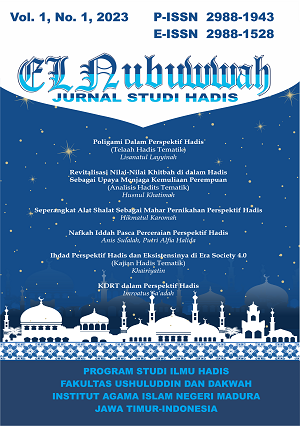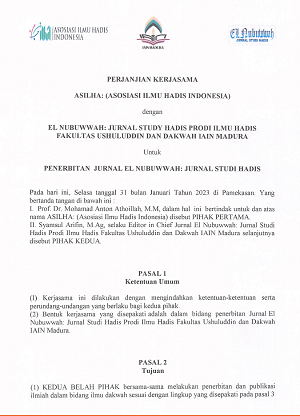Nafkah Iddah Pasca Perceraian Perspektif Hadis
(Studi Kasus di Desa Panaguan Kecamatan Larangan Kabupaten Pamekasan)
 Abstract views: 587
,
Abstract views: 587
,
 PDF downloads: 1322
PDF downloads: 1322
Abstract
If the divorce is granted by the court, it will have consequences as contained in Islamic Law Compilation (149), one of which is regarding the obligation to provide. However, in reality, the community thinks that the obligations at home also end, resulting in the rights of the wife not being fulfilled, as happened in the people of Panaguan village. This article aims to explain the factors causing the fulfillment of iddah income after divorce as well as a review of hadiths regarding the obligations of post-divorce maintennace of iddah. This research includes empirical or field research with a case study approach using qualitative research methods. Primary data sources were obtained through interviews, while secondary data was sourced from literature review. Research result are; (1) Implementation of post-divorce iddah maintenance in Panaguan village was not realized properly because many ex-wives did not get the right to iddah maintenance due to a lack of knowledge of the religious community regarding post-divorce living, lack of legal understanding of post-divorce rights, intentional factors, divorce out of court, as well as community customs. (2) In reviewing the hadiths, the obligation to support iddah has previously been regulated in the Qur’an in QS. at-Thalaq verse 6 and reinforced by a hadith narrated by an-Nasa’i in the book of Sunan al-Nasa’i. Additionally, QS. al-Baqarah verse 241 is reinforced in by hadith narrated by Ibn Majah in the book Bulg al-Marm min Adillatil Ahkm and is found in the hadith narrated by Muslim as well as in the same book.
Downloads
References
Abrol, Khoirul. Hukum Perkawinan dan Perceraian. Yogyakarta: Bening Pustaka, 2020.
al-Asqalani, Hafidz Ibn Hajar. Bulughul Maram Min Adillati Al-Ahkam. Surabaya: Al-Miftah, tt.
Al-Nasa’i , Sunan al-Nasa’i Jilid 6. Libanon: Dar al-Fikr, 2005.
Anggraini. “Pemberian Nafkah Iddah Dan Mut’ah Terhadap Istri Yang Nusyuz Perspektif Hukum Positif Dan Hukum Islam (Studi Putusan Hakim No. 677/Pdt.G/2016/PA.Bn)”. Skripsi, UIN Fatmawati Sukarno, Bengkulu, 2022.
Aplikasi Kitab Tafsir Jalalain Terjemahan Indonesia
Bachtiar. Metode Penelitian Hukum. Tangerang Selatan: Umpam Press, 2018.
Departeman Agama RI, Al-Qur’an dan Terjemahannya. Jakarta Timur: Maghfirah Pustaka, 2006.
Efendi, Jonaedi dan Johnny Ibrahim. Metode Penelitian Hukum Normatif dan Empiris. Depok: Prenadamedia Group, 2016.
Hamzanwadi. “Pelaksanaan Nafkah ‘Iddah Pasca Ikrar Talaq Di Luar Pengadilan Agama (Studi Kasus di Kecamatan Batukliang)”. Thesis, UIN Mataram, Mataram, 2021.
Moleong, Lexy J. Metodologi Penelitian Kualitatif. Bandung: PT Remaja Rosdakarya, 1989.
Ramdani, Riyan. “Penentuan Besaran Nafkah Madhiyah, Nafkah Iddah dan Mut’ah Dalam Perceraian di Pengadilan Agama,” Adliya: Jurnal Hukum dan Kemanusiaan, Vol. 15, No. 1. 2021.
Sabaruddin. “Nafkah Bagi Istri Dalam Masa Iddah Talak Raj’i (Studi Pemahaman Masyarakat Kuala Baru, Aceh Singkil),” Tadabbur: Jurnal Peradaban Islam, Vol. 1 No. 2. 2019.
Saebani, Beni Ahmad .Fiqh Munakahat 1. Bandung: CV Pustaka Setia, 2001.
Sahfira, Hanandya Naufi Fatca. “Memahami Pemberian Nafkah Iddah dan Mut’ah Pada Perkara Cerai Gugat. CPNS Analis Perkara Pengadilan Agama Lamongan)”.
Saputra, M. Yanis. “Tinjauan Epistemologi Terhadap Pertimbangan Hakim Dalam Penentuan Nominal Nafkah Iddah dan Mut’ah Bagi Istri Yang Diceraikan (Kajian Dalam Filsafat Keadilan),” Website Pengadilan Agama Maninjau, Vol. 2 No. 2. Maret, 2021.
Soumena, M. Yasin. “Pemberlakuan Aturan Perkawinan Adat Dalam Masyarakat Islam Leihetu-Ambon (Analisis Antro-Sosiologi Hukum),” Hukum Diktum, 1. Januari, 2012.
Tihami, H.MA dan Sohari Sahrani. Fiqh Munakahat. Jakarta: PT RajaGrafindo Persada, 2009.
Undang-undang RI Nomor 1 Tahun 1974 Tentang Perkawinan & Kompilasi Hukum Islam. Bandung: Citra Umbara, 2012.
Copyright (c) 2023 El-Nubuwwah: Jurnal Studi Hadis

This work is licensed under a Creative Commons Attribution-ShareAlike 4.0 International License.






















